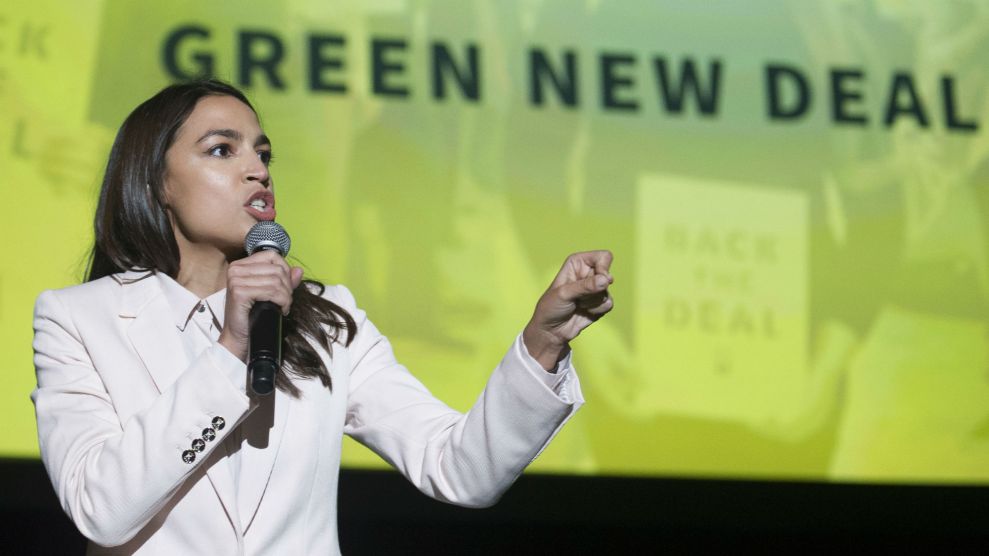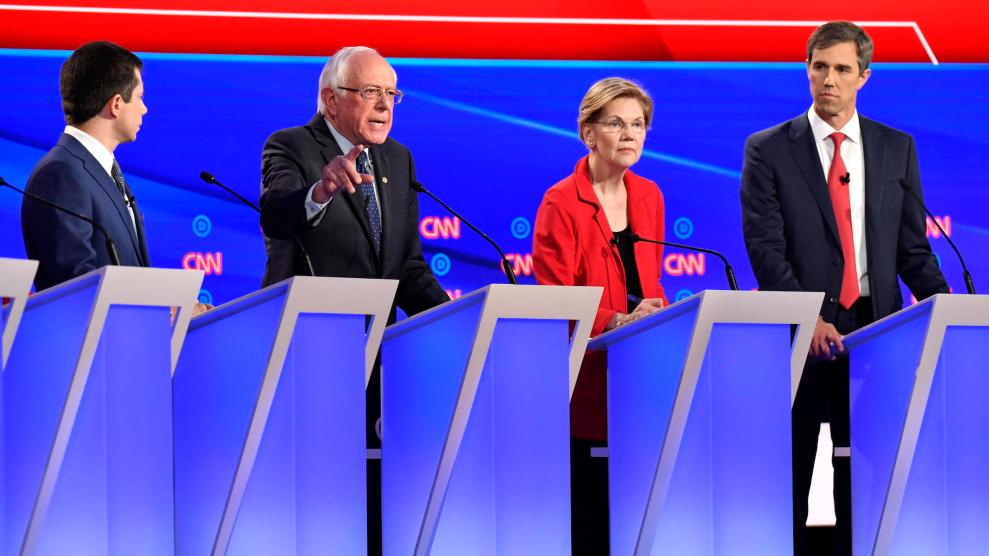
Rep. Alexandria Ocasio-Cortez, D-N.Y., addresses The Road to the Green New Deal Tour final event at Howard University in Washington, Monday, May 13, 2019Cliff Owen / AP Photo
This piece was originally published in HuffPost and appears here as part of our Climate Desk Partnership.
Sunrise Movement, the youth campaign behind the Green New Deal, called 25,000 Iowans and persuaded 7,000 to sign pledges to vote for the candidate who advocated the most ambitious plan for rapidly lowering planet-heating emissions along with guaranteeing federal jobs to displaced workers.
In New Hampshire, the group called 33,000 voters and racked up 12,000 pledges that it claimed delivered a win for Democratic presidential candidate Bernie Sanders.
Now Sunrise Movement is pulling back from the presidential contest and redirecting its efforts toward a trio of March 3 congressional primaries in Texas, hoping a victory in the oil and gas industry’s mecca will add momentum to the two-year-old Green New Deal movement.
On Thursday night, the group plans to announce its endorsement of Heidi Sloan, a democratic socialist running on the Green New Deal in the Democratic primary to take on Rep. Roger Williams (R-Texas), HuffPost has learned.
Then, in the coming weeks, Sunrise Movement is sending its army of canvassers to knock on doors in support of Sloan, Democratic Rep. Henry Cuellar’s left-wing challenger Jessica Cisneros and Mike Siegel, the progressive Green New Dealer running against two other Democrats in the race to take on Rep. Michael McCaul (R-Texas).
The group plans to direct its nearly 350 local chapters across the country to make phone calls for the three candidates. Sunrise said it will marshal hundreds of Spanish-speaking volunteers to call voters for Cisneros, whose 28th Congressional District stretches southwest from San Antonio to the Mexican border.
“For us, Texas is both the frontlines of the climate crisis and the extreme energy fossil-fuel industry,” Sunrise Movement’s political director Evan Weber told HuffPost by phone Thursday morning. “If we can show that running boldly on the Green New Deal without moderating or hedging is a path to victory for Democrats, we think it can transform the entire conversation in this nation.”
It’s the sort of brazen bet Sunrise has taken before. After forming in mid-2017 and cutting its teeth on a handful of progressive midterm campaigns, the nonprofit stormed into the national spotlight in late 2018 when it staged high-profile protests in then-incoming House Speaker Nancy Pelosi’s office to demand the new Democratic House majority champion a Green New Deal slate of legislation.
The demonstrations did little to convert skeptics in the party’s centrist establishment. But it made the Green New Deal a mainstay for progressives and established the concept of a sweeping green industrial plan paired with an aggressive expansion of the federal safety net as the climate lodestar for left-wing parties in Europe and Latin America.
Money Versus People
If Sunrise spent much of the year since painting its opponents in the Democratic Party as puppets of the fossil fuel industry, the Texas races offer an opportunity to spar with the puppeteers.
Cisneros, a 26-year-old human rights lawyer, gained national attention last year when she announced her bid to take on Cuellar, a conservative Democrat with deep ties in the mostly-Hispanic district. Dubbed “Big Oil’s favorite Democrat,” Cuellar, 64, has worked closely with Republicans in the state and once served as former Texas Gov. Rick Perry’s secretary of state.
Cuellar has voted in line with President Donald Trump’s policy positions nearly 45% of the time since 2017, and 69% during the administration’s first two years, according to a FiveThirtyEight tally. The League of Conservation Voters gave Cuellar a 42% cumulative score on its ranking of lawmakers’ pro-environmental votes.
Cuellar’s allies are sending in cavalry of their own. Oil and gas political action committees spent $116,000 on his campaign since 2019, filings collected by the nonpartisan Center for Responsive Politics show. Nine electric utilities, most of whose business depends on fossil fuels, pitched in another $28,500.
The U.S. Chamber of Commerce, which does not disclose its donors but spent years funding climate misinformation campaigns, is already airing a 30-second ad in Spanish touting Cuellar’s record of passing the new U.S.-Mexico-China trade agreement and boosting auto manufacturing in the state. The group told the Federal Election Commission in a filing that it planned to spend $200,000 on TV ads mentioning Cuellar. A top U.S. Chamber of Commerce official publicly vowed to lock horns with Justice Democrats, the progressive group behind the campaign of Rep. Alexandria Ocasio-Cortez (D-N.Y.), which has backed Cisneros.
“This is a first for us, and we’re putting our money where our mouth is,” Scott Reed, the U.S. Chamber’s senior political strategist, told The Texas Tribune this month. “It’s game on, Justice Democrats.”
The U.S. Chamber did not respond to emailed questions about whether it planned to add any resources to back Cuellar or get involved in the other two races, but it said it would hold a “big endorsement event in Texas” ahead of the primary.
In the other two districts, the industry may be playing a game of wait and see.
Cuellar’s 28th District leans Democratic by 9 points on the Cook Political Report PVI ranking. That made it a prime target for Sunrise and its allies, who have primarily focused on replacing pro-business Democrats in safely blue districts with Green New Deal progressives.
But Colin Strother, a Cuellar spokesman, said he’d never even heard of what he called “that Sunshine thing.”
“If they have a footprint in this district, it must be the size of a small rabbit,” he said. He accused Cisneros’s campaign of being a social media Potemkin village, where the nationwide eyeballs on the candidate’s Instagram and Facebook posts don’t match the general disinterest on the ground in the district.
“Our opponent’s entire campaign has been doing it for the ’Gram,” he said. “None of it’s been real, but they’ve made it look real.”
A spokeswoman for the Cisneros campaign did not respond to an interview request.
The 10th Congressional District, which sprawls from Austin’s northern suburbs to the area west of Houston, leans GOP by 9 percentage points and has elected McCaul eight times since 2005. The Republican boasts a paltry 5% lifetime score from the League of Conservation Voters and owns between $8.2 million and $19.1 million worth of stock in oil, gas and coal, making him, by the watchdog site Sludge’s estimate, “Congress’s biggest fossil fuel investor.” (He also, according to the Austin American-Statesman, used more water than any other resident of the Texas capital in 2017.)
Siegel, who was the Democratic nominee in the district in 2018, lost to McCaul by 46.8% to 51.2%. This time, Sunrise hopes the increased turnout of a presidential election and the added firepower of its national campaigners can push him over the edge.
“We believe that in 2020, with higher voter turnout and having the Green New Deal movement at Siegel’s back, that we can really secure this seat for a Green New Deal champion,” Weber said.
But first he’ll have to beat two other Democratic challengers: Pritesh Gandhi, a doctor whose climate platform hinges on a carbon pricing scheme, and Shannon Hutcheson, a lawyer running on an even thinner proposal to increase flood protection.
Siegel told HuffPost he’s confident he’ll seize the nomination again.
“My campaign far and away has the most grassroots and community support,” Siegel said by phone. “That’s reflected in our volunteer army, our field program and the fact that we’ve knocked 30,000 doors already and we have many more block walks lined up in the days ahead. Our ability to reach voters directly, person to person, is unparalleled.”
Sloan’s primary fight is slightly different. The Democratic Socialists of America member is running against Julie Oliver, an Austin public health official and progressive whose platform also includes a Green New Deal. But at least one canvasser in the race compared the difference in styles between the candidates to how Sanders diverges from his progressive rival Elizabeth Warren, describing Sloan as the more movement-oriented leftist.
Weber, whose group’s rank-and-file members voted to endorse Sanders last month, said Sunrise was “more attracted to Heidi’s theory of change.”
Whoever emerges from the primary will take on Williams, who flipped a long-held Democratic seat red in 2013 and has held it ever since. Williams, whose $46.4 million net worth makes him the 11th richest House member as of 2016, is already amassing a considerable warchest, including nearly $91,000 so far in oil and gas donations.
Neither McCaul nor Williams responded to requests for comment.
Labor Support
All four Green New Deal supporters in the three races already won something rather historic: endorsements from the state’s largest labor union. The Texas AFL-CIO made a dual endorsement of Sloan and Oliver. But its support for Cisneros and Siegel captured national attention. For Cisneros, that’s partly because the union skewered Cuellar as “not on working people’s side.” For Siegel, it was because he won over skeptical oil industry workers who were ultimately sold on his promise, as he recounted to the New Republic, to “make our demands to take care of you as specific as our demands to unwind fossil fuel energy production.”
“Being from a union family, being a two-time union member myself, having a unionized campaign staff, it was extremely important for me to win that endorsement,” he told HuffPost. “I was able to do that because I built trust and let these folks know I’m fighting for a Green New Deal and I’m not leaving these workers behind.”
Climate Concerns
At 52%, a narrow majority of Texans understand that humans are causing climate change, according to a 2019 Yale Program on Climate Change Communication survey. Yet partisan divides remain stark. Last March, a University of Texas/Texas Tribune poll of registered voters in the state found 83% of Democrats supported strong government actions on climate change, compared with just 18% of Republicans. Independent voters, meanwhile, leaned toward more government intervention, with 43% favoring strong action, 26% supporting mild action and 24% preferring the U.S. government do nothing at all.
Hurricane Harvey’s deadly 2017 deluge in Houston jolted many in the state’s urban regions, and a prolonged drought across much of the state may “persuade voters that pursuing a policy course that addresses that long term is a wise course of action,” said Brandon Rottinghaus, a professor of political science at the University of Houston.
But he questioned the logic of devoting resources to these three races in particular, calling them “unusual” and “various choices.”
“These are tough districts to win for progressives,” he said.
Weber admitted that “these are not places where our movement has really shown it can be victorious yet.” But he said the campaigns’ enthusiasm for the Green New Deal and the potential to oust both a right-wing Democrat and conservative Republicans offers the opportunity to “really demonstrate the two types of victories that we need this year in order to win a Green New Deal.”
It’s a busy year ahead for Sunrise.
After the Texas primary, the nonprofit is gearing up for the March 17 elections in Illinois, where it has endorsed progressive Marie Newman against abortion foe Rep. Dan Lipinski (D-Ill.). It is also backing Rep. Bobby Rush (D-Ill.) challenger Robert Emmons Jr., a 26-year-old activist pitching the Green New Deal as a way to stem Chicago’s gun violence.
In Ohio, Sunrise Movement is backing activist Morgan Harper against Rep. Joyce Beatty (D-Ohio).
Sunrise then plans to shift its focus to Kentucky’s May 15 primary, where it’s hoping to boost Charles Booker’s underdog bid to take on Senate Majority Leader Mitch McConnell and secure a win for Sanders.
“We’re trying to focus as much as possible on the places where we can have an impact on the presidential primary as well as down-ballot races,” Weber said. “After how we made a difference in Iowa, and then even more so in New Hampshire, people are going to be seeing a lot more of us.”
Kyna Doles contributed to this report.








